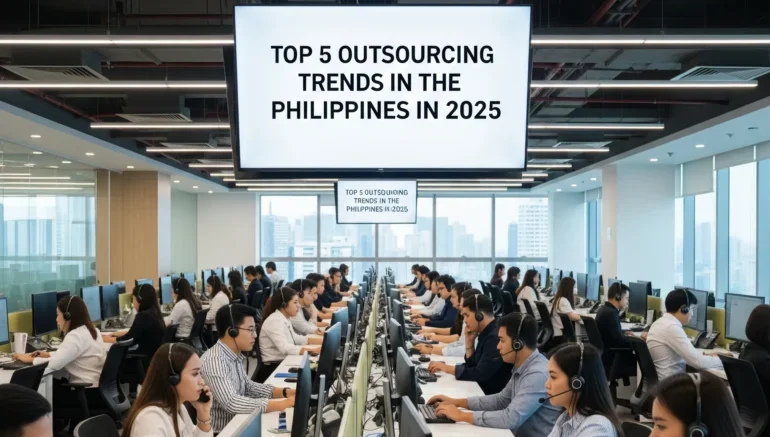
Top 5 Outsourcing Trends in the Philippines in 2025
The outsourcing trends in the Philippines has grown steadily, making it one of the most competitive hubs for business services in the world. Companies from different countries trust Filipino talent for tasks ranging from customer support to software development. The industry continues to evolve, bringing new opportunities and challenges for businesses and employees alike. Learning about these changes can help companies make better decisions and stay ahead in the market.
Filipino outsourcing providers are adapting to new business models, client needs, and global trends. Workers are building new skills, while companies are finding smarter ways to manage costs and productivity. These shifts are not only affecting the business landscape but also shaping the way people work and interact in offices and remote setups. In this article, we will explore five outsourcing trends in the Philippines to watch in 2025, helping business owners, managers, and professionals plan for the year ahead.
Here’s some 5 Outsourcing Trends in the Philippines in 2025
The outsourcing sector is constantly changing, with new trends emerging every year. In the Philippines, the combination of skilled talent, competitive costs, and flexible work arrangements makes the industry attractive for both local and international companies. By understanding the trends shaping outsourcing in 2025, businesses can improve service quality, optimize operations, and stay competitive.
These trends also reflect how technology, global business requirements, and workforce expectations are evolving. Companies that adapt early can benefit from better efficiency, stronger client relationships, and increased market presence. Below are the five outsourcing trends in the Philippines to watch in 2025 and how they are likely to influence the industry.
Increased Demand for Remote Work Support
 Remote work continues to be a major factor in outsourcing decisions. Many companies are choosing to hire offshore teams in the Philippines to handle tasks that do not require physical presence. This allows businesses to save costs while still maintaining high quality service. Remote work has also opened opportunities for Filipino professionals to work with international companies from their own homes, improving work life balance and job satisfaction.
Remote work continues to be a major factor in outsourcing decisions. Many companies are choosing to hire offshore teams in the Philippines to handle tasks that do not require physical presence. This allows businesses to save costs while still maintaining high quality service. Remote work has also opened opportunities for Filipino professionals to work with international companies from their own homes, improving work life balance and job satisfaction.
How companies are adapting to remote outsourcing:
- Using secure collaboration tools like video calls and project trackers to connect teams.
- Offering flexible shifts that match different client time zones.
- Conducting regular online training to improve communication and technical skills.
- Setting clear productivity goals and monitoring results through digital dashboards.
- Providing mental health and wellness programs to support remote employees.
- Encouraging team building activities online to maintain company culture.
Focus on Specialized Services
The outsourcing industry is moving beyond basic tasks like data entry or call center operations. Companies are increasingly seeking specialized services such as software development, graphic design, digital marketing, and business analytics. This trend means outsourcing providers must invest in skilled professionals and continuous training programs to meet these demands. With a focus on specialized services, the Philippines can continue to attract high value projects, making it an even stronger player in the global outsourcing market in 2025.
 Tips for businesses seeking specialized outsourcing:
Tips for businesses seeking specialized outsourcing:
- Define required expertise: Know the skills your project needs.
- Check past work: Review projects or case studies.
- Look for trained staff: Prefer providers who invest in ongoing training.
- Choose flexible contracts: Scale services as needed.
- Start with pilot projects: Test quality before full scale outsourcing.
Integration of Technology Tools
While outsourcing in the Philippines is driven by skilled talent, technology tools play a significant role in improving efficiency and communication. Companies are increasingly using project management software, customer support platforms, and analytics tools to streamline workflows. These tools help teams deliver consistent results while keeping clients informed and satisfied.
 Best practices for using technology in outsourcing:
Best practices for using technology in outsourcing:
- Rely on cloud based platforms for secure file sharing and collaboration.
- Use automation tools to handle repetitive tasks and reduce errors.
- Implement time tracking apps to measure productivity fairly.
- Set up reporting systems with dashboards for real time project updates.
Emphasis on Up Skilling and Employee Development
The success of outsourcing depends heavily on the skills and knowledge of the workforce. In 2025, there is a growing focus on training programs and professional development for Filipino employees. Companies that invest in learning and development can provide higher quality services and retain top talent. By supporting continuous learning, outsourcing providers not only improve service quality but also strengthen employee satisfaction and loyalty, ensuring long term growth in the industry.
 Ways outsourcing providers support employee growth:
Ways outsourcing providers support employee growth:
- Offering free or sponsored online courses related to client needs.
- Encouraging certifications in IT, finance, design, and other specialized fields.
- Creating mentorship programs where senior staff guide new employees.
- Organizing workshops that focus on leadership and soft skills.
Stronger Focus on Client Relationships
Outsourcing is no longer just about cost savings; it’s about building partnerships. Filipino providers are prioritizing stronger communication, regular feedback, and proactive problem solving to maintain long term client relationships. Companies that nurture these relationships can gain repeat business and positive referrals. By focusing on client satisfaction, outsourcing providers in the Philippines can continue to grow their reputation and compete effectively in the global market.
 Steps to build stronger client relationships:
Steps to build stronger client relationships:
- Schedule regular video or phone meetings to align with client expectations.
- Share transparent progress reports with clear updates and next steps.
- Respond quickly to issues or requests to build trust and reliability.
- Offer personalized solutions that match each client’s goals.
Conclusion
The outsourcing industry in the Philippines is moving forward at a fast pace, bringing changes that affect how companies work and how talent is hired. Key trends such as remote work, specialized services, stronger use of technology, continuous employee training, and improved client relationships are setting the direction for 2025. Businesses that adjust to these shifts can improve their processes, offer better results, and create long term partnerships. For outsourcing providers in the Philippines, adopting these practices means staying competitive in the global market. It also opens more opportunities to attract new clients and strengthen trust with existing ones. The future of outsourcing will depend on how quickly companies adapt and how well they support both clients and employees. These trends are not just shaping business strategies but also changing the way professionals grow and work together.
Read Next: 10 Key Steps to Achieve Outsourcing Success










